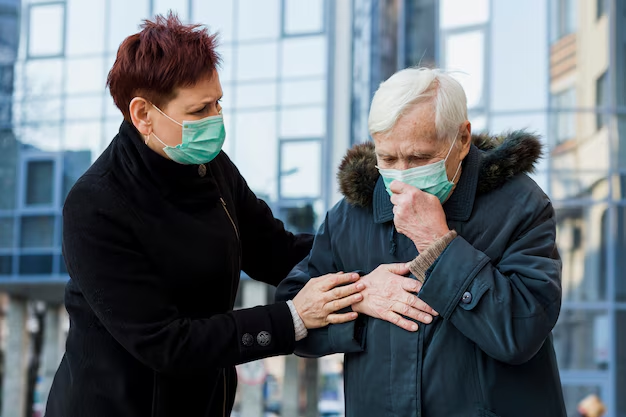Can Bronchitis Lead to Pneumonia?
Experiencing a persistent cough can be frustrating, especially when it seems like a simple cold has turned into something more serious. Both bronchitis and pneumonia are respiratory conditions that can stem from the common cold. While they share some symptoms, understanding their differences and how one can potentially lead to the other is crucial for maintaining good health.
Understanding Bronchitis
What is Bronchitis?
Bronchitis is an inflammation of the bronchial tubes, the airways that carry air to your lungs. This condition often arises when a respiratory tract infection or irritant causes swelling in these airways. There are two main types of bronchitis:
- Acute bronchitis: Usually lasts a few days to weeks and often follows a cold or viral infection.
- Chronic bronchitis: A more severe, long-term condition that's part of chronic obstructive pulmonary disease (COPD), usually caused by smoking or long-term exposure to lung irritants.
Symptoms of Bronchitis
Common symptoms include:
- Persistent cough
- Mucus production
- Fatigue
- Shortness of breath
- Mild fever and chills
- Chest discomfort
Causes and Risk Factors
Bronchitis is commonly caused by viral infections, but bacterial infections, smoking, and exposure to pollutants can also contribute. Factors increasing the risk include:
- Smoking
- Weak immune system
- Exposure to irritants
- Gastroesophageal reflux disease (GERD)
Recognizing Pneumonia
What is Pneumonia?
Pneumonia is an infection that inflames the air sacs in one or both lungs, which may fill with fluid or pus. This condition can range from mild to life-threatening and often requires medical attention. Types of pneumonia include:
- Community-acquired pneumonia (CAP)
- Hospital-acquired pneumonia (HAP)
- Aspiration pneumonia
- Walking pneumonia
Symptoms of Pneumonia
Pneumonia symptoms are generally more severe than bronchitis and can include:
- High fever
- Chills
- Shortness of breath
- Sharp or stabbing chest pain
- Confusion (especially in older adults)
- Excessive fatigue
Causes and Risk Factors
Pneumonia is often caused by bacteria, viruses, or fungi. Risk factors include:
- Chronic conditions such as asthma or COPD
- Weakened immune system
- Hospitalization
- Smoking
Can Bronchitis Turn Into Pneumonia?
How Bronchitis Develops into Pneumonia
While not every case of bronchitis leads to pneumonia, the condition can sometimes progress if the initial infection worsens or moves deeper into the lungs. Factors that might contribute include:
- Impaired immune function: When the body struggles to combat the initial bronchial infection, it may descend into lung tissue, resulting in pneumonia.
- Delayed or incorrect treatment: Failing to address bronchitis early on can allow the infection to worsen.
- Underlying health conditions: Those with chronic illnesses may have a higher chance of developing pneumonia from bronchitis.
When to Seek Medical Advice
It's essential to consult a healthcare provider if:
- Symptoms persist or worsen
- High fever develops
- Breathing becomes difficult or painful
- There's a significant change in mucus color or volume
Prevention Strategies: Keeping Bronchitis from Escalating
Boosting Your Immune System
Bolstering your immune system can help ward off infections or prevent them from worsening. Practical strategies include:
- Eating a balanced diet rich in vitamins and minerals
- Exercising regularly
- Getting sufficient sleep
- Managing stress effectively
Vaccination and Medical Care
- Vaccinations: Pneumonia vaccines can help prevent certain types of pneumonia.
- Regular check-ups: Visiting your doctor annually can catch and manage chronic respiratory issues early.
Lifestyle Adjustments
- Quit smoking: Smoking is a major risk factor for both bronchitis and pneumonia.
- Avoid pollutants and irritants: Wearing masks and improving indoor air quality can minimize exposure.
Home Care: Supporting Recovery from Bronchitis and Preventing Pneumonia
Effective Home Remedies
- Hydration: Drink plenty of fluids to thin mucus.
- Steam inhalation: Helps relieve congestion and ease breathing.
- Honey and tea: Soothe throat irritation and reduce coughing.
When Home Care Isn't Enough
Home care can be effective for mild cases of bronchitis. However, medical intervention is necessary when symptoms are severe or persistent.
Knowing the Difference: Bronchitis vs. Pneumonia
Diagnostic Approaches
Doctors typically use:
- Chest X-rays to identify pneumonia.
- Blood tests to pinpoint infections' nature.
- Sputum tests to determine the presence of bacteria or virus in the lungs.
Treatment Variations
Bronchitis treatment often involves rest, fluids, and over-the-counter medications. In contrast, pneumonia may require antibiotics, antiviral treatment, or hospitalization for severe cases.
Empowering Your Health Journey
Understanding the nuances between bronchitis and pneumonia empowers you to manage your health more effectively. By recognizing symptoms early, seeking timely medical advice, and taking preventive measures, you can reduce the risk of complications and swift recovery.
Quick Reference Summary 🌟
- Bronchitis usually starts as a viral infection, with symptoms like persistent cough and mucus production. 🌬️
- Pneumonia is more severe, possibly presenting with fever, chills, and sharp chest pains. 🏥
- Preventive Tips:
- Strengthen immunity via diet and exercise. 🍏💪
- Consider vaccinations for vulnerable groups. 💉
- Avoid smoking and pollutants. 🚭
- Seek medical advice if symptoms persist or worsen, ensuring early diagnosis and treatment to prevent complications. 🩺

Related Articles
